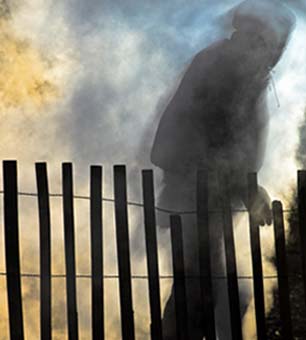Honest, paywall-free news is rare. Please support our boldly independent journalism with a donation of any size.
When Hillary Smith was 15 years old, her parents died. For the next eight years, she lived in Golden Gate Park, sleeping each night with many other homeless youths, all with different struggles that resulted in homelessness.
“I became homeless,” Hilary said during a hearing at City Hall on youth and LGBTQ homelessness, “at the age of 15, when my parents died. I pretty much got abandoned and thrown into the muck of things, I guess you could call it. People ignored me when I was homeless. Asking for help wasn’t just something I could go do. Asking like, ‘What time is it?’ almost always ended up in me getting completely ignored. Mostly, when I asked people what time it was, they’d say, ‘No thank you.’ “
Hillary’s story is all too familiar in San Francisco, a city that prides itself on being a sanctuary to those in need. According to one homeless count, 1,902 youth – a count that includes “transitional youth,” those under 24 – are currently homeless, and, astonishingly, over 50 percent of these youth have been homeless for more than a year. Forty percent of these youth are LBGTQ, and the majority said their homelessness was due to job loss.
To address youth and LGBT homelessness, and to address homelessness as a whole, the city of San Francisco held a total of five hearings during the months of April and May. Youth and LGBTQ homelessness were specifically addressed on the final of these five hearings, May 28.
Unfortunately, for the fifth time in five tries, the city failed to do anything besides powdering up their public relations face with the blush composed of five back-patting hearings on homelessness. City supervisors opened the final meeting with a politically correct, sentimental statement about how they are trying with all of their hearts to stop the growing problem of homeless.
“We have a responsibility as a city government to make sure that we provide not only shelter but also services for these young people,” said San Francisco City Supervisor David Campos.
Currently, in San Francisco, 68 housing beds are available for 1,902 homeless youths, which means 96.5 percent of the homeless youth population do not have supportive housing available.
If 68 beds for 1,902 homeless youth is what the city means by responsibility, then one must question the intention of those who claim to be responsible. If 68 beds for 1,902 homeless youth is what the city means by providing, then one must question those who say they are making sure to provide. If 68 beds for 1,902 homeless youths is what the city has accomplished, then one must question the character and the intent of those who have made such an accomplishment.
Dr. Colette Auerswald, an associate professor of Community Health and Human Development at UC Berkeley, pointed out the life-threatening dangers of youth homelessness. She stated that, “This condition leads to death 8 times more (frequently) for young men and 13 times more (frequently) for young women.”
Auerswald said there are several ways to end youth homelessness in San Francisco, including fulfilling the city’s commitment to building all 400 housing units for homeless youth, finding further projects to house the other thousands of homeless youth, extending the transitional age services to foster children and homeless youth, and stopping the criminalization of youth for their poverty, which creates greater barriers to obtaining housing, education and jobs.
Strangely, these ideas presented by Auerswald are not new. Therefore, because these ideas are not new, because they were known before the hearings, and because nothing was formally decided at the hearings, we must conclude that these five hearings have done nothing.
We must conclude that these hearings will not help the homeless man, woman or child who, tonight, will be sleeping on the street and who, tomorrow, will be sleeping on the same street. What was once a city that was known as a sanctuary, once a city where compassion was not just talked about but acted upon, seems to have become a city masked by expensive makeup and false hope.
A quote by Carl Jung says: “Children are educated by what the grown-up is and not by his talk.” Recall that Hilary Smith was a 15-year-old child when she first became homeless. Remember that the hearings on homelessness are finished; the talk of the grown-ups is complete, and the idleness of the Board of Supervisors continues. Know that the youth outside on San Francisco’s city streets are not being educated by grown-up talk, but rather by grown-up action: none.
Media that fights fascism
Truthout is funded almost entirely by readers — that’s why we can speak truth to power and cut against the mainstream narrative. But independent journalists at Truthout face mounting political repression under Trump.
We rely on your support to survive McCarthyist censorship. Please make a tax-deductible one-time or monthly donation.
